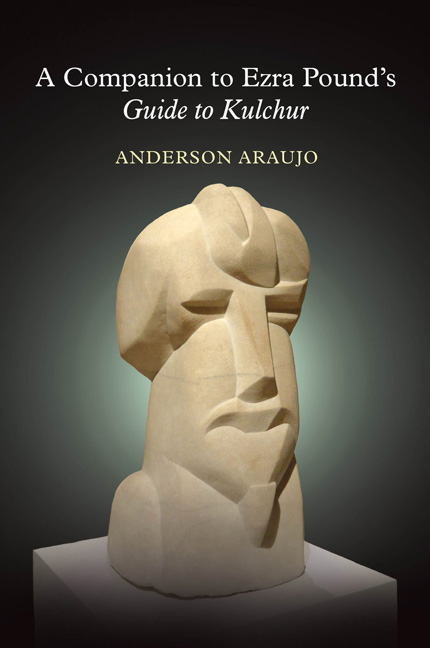Book contents
- Frontmatter
- Contents
- Acknowledgments
- Abbreviations
- Introduction
- Guide to Kulchur
- Part I
- Section I
- Section II
- Part II
- Section III
- Section IV
- Part III
- Section V
- Section VI
- 22 Savoir Faire
- 23 The New Learning: Part Two
- 24 Examples Of Civilization
- 25 Books “About”
- 26 On Answering Critics
- Part IV
- Section VII
- Section VIII
- Section IV
- Part V
- Section X
- Section XI
- Part VI
- Section XII
- Section XIII
- Addenda: 1952
- Notes
- Index
24 - Examples Of Civilization
from Section VI
- Frontmatter
- Contents
- Acknowledgments
- Abbreviations
- Introduction
- Guide to Kulchur
- Part I
- Section I
- Section II
- Part II
- Section III
- Section IV
- Part III
- Section V
- Section VI
- 22 Savoir Faire
- 23 The New Learning: Part Two
- 24 Examples Of Civilization
- 25 Books “About”
- 26 On Answering Critics
- Part IV
- Section VII
- Section VIII
- Section IV
- Part V
- Section X
- Section XI
- Part VI
- Section XII
- Section XIII
- Addenda: 1952
- Notes
- Index
Summary
The Tempio Malatestiano … Malatesta managed against the current of power: Cf. notes GK 2. “Zuan Bellin” is Bellini (cf. 25/120, 45/230). In saying that “Federigo Urbino was his Amy Lowell” Pound is drawing an analogy between the “lifelong mortal feud” between Sigismundo and Urbino (also known as Federico III da Montefeltro) and Pound's own protracted literary feud with American poet Amy Lowell (1874–1925) over Imagism, the free verse movement he had helped to found and left almost as soon as the first anthology was published in 1914. Pound sneeringly punned on Imagism under Lowell's stewardship as “Amygism.”
St Hilaire: Cf. note GK 109.
If ever Browning had ready an emphasis for his “reach and grasp” line: Truncated phrase from “Andrea del Sarto,” Browning's dramatic monologue, “Ah, but a man's reach should exceed his grasp / Or what's a heaven for?”
Gemisto's conversation at Ferrara: Here, as in The Cantos (8/31), Pound alludes to the 1438–39 Council of Ferrara, a harried bid by the Byzantine emperor, John VIII Palaeologus (1392–1448), and Pope Eugenius IV to end the schism between the Greek and Latin Churches and defend Christendom against the Ottoman Empire. Gemistos Plethon, the Byzantine philosopher, was in attendance. Fears of the Black Death in Ferrara drove delegates to move the Council to Florence. Amid the theological proceedings of the Council, Gemisto gave public lectures on the key differences between Plato and Aristotle, likely at the behest of Cosimo de’ Medici, founder of the Platonic Academy. His aim was to substitute Plato for Aristotle as the basis of metaphysical conjecture. Pound irreverently recaps the ecumenical event in Canto 26 as a decision “on the holy ghost / And as to the which begat the what in the Trinity” (26/123–24).
Cunizza at Cavalcanti the elder's: Cf. note GK 107–8.
Ficino: Marcilio Ficino (1433–99), Italian Renaissance philosopher, humanist, and priest. Ficino headed the syncretic Platonic Academy of Florence, founded by Cosimo de’ Medici under the influence of Gemistos Plethon.
- Type
- Chapter
- Information
- A Companion to Ezra Pound's Guide to KulcherGuide to Kulcher, pp. 202 - 204Publisher: Liverpool University PressPrint publication year: 2018



